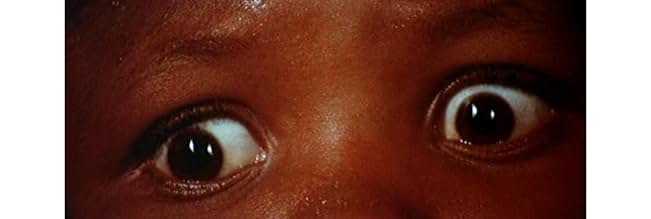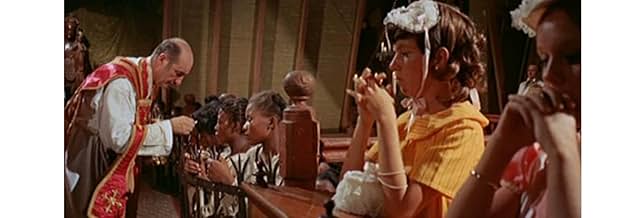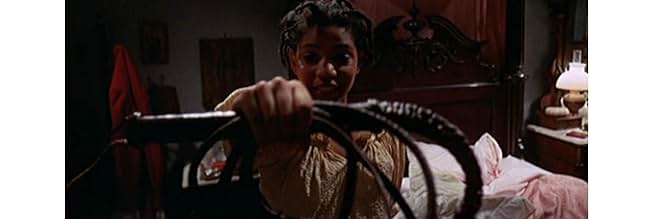AVALIAÇÃO DA IMDb
6,5/10
2 mil
SUA AVALIAÇÃO
Adicionar um enredo no seu idiomaTwo documentary filmmakers go back in time to the pre-Civil War American South to film the slave trade.Two documentary filmmakers go back in time to the pre-Civil War American South to film the slave trade.Two documentary filmmakers go back in time to the pre-Civil War American South to film the slave trade.
- Direção
- Roteiristas
- Artistas
Stefano Sibaldi
- Narrator
- (narração)
Dick Gregory
- Self
- (não creditado)
Gualtiero Jacopetti
- Self
- (não creditado)
Ernest Kubler
- Whip
- (não creditado)
Yayoi Kusama
- Self
- (não creditado)
Franco Prosperi
- Self
- (não creditado)
Shelley Spurlock
- Girl
- (não creditado)
- Direção
- Roteiristas
- Elenco e equipe completos
- Produção, bilheteria e muito mais no IMDbPro
Avaliações em destaque
I've seen a lot of offensive films in my time, from Cannibal Holocaust to A Siberian Film, but this one is easily the most tasteless, offensive, unpleasant films I have ever seen. Yet somehow it is also riveting, like watching a car crash unfold in slow motion. Several times I was on the verge of turning it off in sheer disgust, but found myself holding off, just to see how much more depraved it could get.
The "plot", such as it is, concerns a pair of time-travelling reporters from Italy going back to the south of the USA during the heyday of slavery, to conduct a "inquest" into slavery. Presenting itself as a condemnation of slavery, it instead revels in the unpleasantness, delivering atrocity upon atrocity with a smirk on it's face. The horror inflicted on the slaves in Django Unchained pales in comparison to the never-ending parade of unpleasantries served up here. I suppose it does present a view of what slaves went through at the time, but it's hard to feel that they are condemning the acts when all the slaves are presented as little more than dumb animals.
Amongst the dubious "delights" on offer are rape, castration, paedophilia and the truly horrible scene where the poor reporter is "seduced" by a 13 year old black prostitute. It's made so much worse as everything is presented as though we are seeing it through their eyes.
It's certainly unforgettable, and if you're not easily offended or squeamish, it's worth watching once, even if it's just to see how low Italian exploitation cinema managed to stoop. You might need a good shower afterwards, however.
Rating: 7/10 just for the sheer gall of the film.
The "plot", such as it is, concerns a pair of time-travelling reporters from Italy going back to the south of the USA during the heyday of slavery, to conduct a "inquest" into slavery. Presenting itself as a condemnation of slavery, it instead revels in the unpleasantness, delivering atrocity upon atrocity with a smirk on it's face. The horror inflicted on the slaves in Django Unchained pales in comparison to the never-ending parade of unpleasantries served up here. I suppose it does present a view of what slaves went through at the time, but it's hard to feel that they are condemning the acts when all the slaves are presented as little more than dumb animals.
Amongst the dubious "delights" on offer are rape, castration, paedophilia and the truly horrible scene where the poor reporter is "seduced" by a 13 year old black prostitute. It's made so much worse as everything is presented as though we are seeing it through their eyes.
It's certainly unforgettable, and if you're not easily offended or squeamish, it's worth watching once, even if it's just to see how low Italian exploitation cinema managed to stoop. You might need a good shower afterwards, however.
Rating: 7/10 just for the sheer gall of the film.
Many people who have claimed to see this film have not. Most of those who have seen it, have not understood. GOODBYE UNCLE TOM was directed by Gualtiero Jacopetti & Franco E. Prosperi, the two men who pioneered the documentary movement that came to be known as the "Mondo" film, a term the two dislike immensely. Hot on the heels of their controversial and still-relevant AFRICA ADDIO, it was meant to exonerate them from accusations of racism. Ironically, it would do the exact opposite. It was developed as an idea to adapt the novel "Mandingo" as an historical, documentary style drama. What emerged was a shocking, difficult-to-watch-at-times, treatise on the horrors of slavery, and the source of racism in America, if not the world, today. It was the filmmakers' intention not to pander to a politically correct theory that slaves of the 1840's had a 1970's awareness of their situation. The events are all historically correct. Many of the characters are people who actually lived. The dialogue is verbatim from true manuscripts of the day. The racism is a genuine depiction of plantation life of the day. It was felt that glossing over the African experience in America would be an insult to the pain and suffering of the millions who survived the "middle passage' only to welcome a life a slavery, no different from an animal or piece of property.
Years after it's initial release, the directors have expressed a regret at not opening the film with an explanation stating that this was a film about the emotions of that bygone era, not of the filmmakers themselves.
The controversial final scenes, which take place in contemporary America, are based on "The Confessions of Nat Turner", and are meant to represent an angry, reactionary vengeance on behalf of the millions, with whom the character identifies. Malice for sure, but not unmerited malice. This film should cause strong emotions. Any film that tackles a moral issue must cause debate and conjecture if it is to succeed. What makes the film even more extraordinary is that it succeeds without claiming a moral superiority, or taking a moral stance. What appears on screen are the most graphic, realistic depictions of the North American slave trade of the 19th century, and this film should be required viewing in Black History classes on college campuses, and high schools all over the world, particularly in America. This film preceded ROOTS by six years and stands as a much harsher indictment of the evils of human bondage. This is one of the bravest works of cinema and remains a misunderstood humanitarian masterpiece.
Years after it's initial release, the directors have expressed a regret at not opening the film with an explanation stating that this was a film about the emotions of that bygone era, not of the filmmakers themselves.
The controversial final scenes, which take place in contemporary America, are based on "The Confessions of Nat Turner", and are meant to represent an angry, reactionary vengeance on behalf of the millions, with whom the character identifies. Malice for sure, but not unmerited malice. This film should cause strong emotions. Any film that tackles a moral issue must cause debate and conjecture if it is to succeed. What makes the film even more extraordinary is that it succeeds without claiming a moral superiority, or taking a moral stance. What appears on screen are the most graphic, realistic depictions of the North American slave trade of the 19th century, and this film should be required viewing in Black History classes on college campuses, and high schools all over the world, particularly in America. This film preceded ROOTS by six years and stands as a much harsher indictment of the evils of human bondage. This is one of the bravest works of cinema and remains a misunderstood humanitarian masterpiece.
I viewed this particular film in the summer of 1972 in New York City. I remember that it was opening day and the turnout was surprisingly large. The other thing that I remembered was that I thought the filmmakers had taken an original approach as far as their documentary-style on slavery. As if I were actually there, watching the events take place. As an African-American man, I found the film fascinating and enlightening. The only thing I did find questionable was, once again, the Black man was depicted as a sexual beast with over-sized reproductive organs. I do believe that this, to some, is what made the movie so titillating. Overall, I still had a pleasant movie going experience. I would like to ask any readers of this commentary that if they have any knowledge of how I may a obtain a copy of this film to please contact me through my e-mail.
When I first saw GOODBYE UNCLE TOM several years ago on a muddy bootleg, the level of production value that went into this "shockumentary" impressed me. I was amazed that the filmmakers were able to corral literally hundreds of Black people into degrading and de-humanizing reenactments of various aspects of slavery. But I also understood that this was a very special film for that exact reason. Unlike American films about slavery, it makes no effort to excuse or sugarcoat this heinous act. Like the opening of Bunuel's Un Chien Andalou, the filmmakers intent is to force you to open your eyes to the truthful horrors of this 400 year old practice.
The premise of the film is brilliant--an Italian documentary film crew is transported "back in time" to interview and bear witness to American Slavery on all levels--from rich slave owners, to the "veterinarian" who must clean and delouse the slaves, to the poor whites who don't own slaves but invade their quarters for the purposes of rape this movie holds nothing back, etc. It loses points for some gratuitous nudity and violence (Mandingo, anyone?), and it's contemporary ending (which tries to connect the Black Power movement and the Nat Turner 1831 slave revolt) is somewhat muddled and clearly designed to leave viewers terrified. The concept that Black men still hate white people but crave their women but would prefer to kill them rather than make love to them is an idea better tackled in the film version of Baraka's DUTCHMAN. If the film were made a few years later it might end by raising the question of whether or not Black are still enslaved--not by carnal lust, but in a prison of the mind.
But the recent DVD release of this film (and its Director's Cut) brings to light two things the shoddy bootlegs didn't. (1) Unlike typical grindhouse exploitation, this is first and foremost a work of art--the opening shot, taken from a helicopter flying over a plantation over a field of slaves, then drawing low enough to blow away the bales of cotton and causing the slaves to flee in glee is GENIUS. Every image and idea is incredibly thought out. The score is up there with the best of Morricone and Rota . The photography and widescreen compositions are top-notch.
However, it is unsettling to discover (2), most of the film was shot in Haiti with the full cooperation of mercenary dictator "Papa Doc" Duvaluier and the Tontons Macoutes (who probably had no problem getting hundreds of Hatian natives willing to degrade and dehumanize themselves for the purpose of making a film). ). In the end, this is a painful film to watch on many levels, but deserves to be seen alongside Alex Haley's ROOTS. 8.5/10 Stars.
The premise of the film is brilliant--an Italian documentary film crew is transported "back in time" to interview and bear witness to American Slavery on all levels--from rich slave owners, to the "veterinarian" who must clean and delouse the slaves, to the poor whites who don't own slaves but invade their quarters for the purposes of rape this movie holds nothing back, etc. It loses points for some gratuitous nudity and violence (Mandingo, anyone?), and it's contemporary ending (which tries to connect the Black Power movement and the Nat Turner 1831 slave revolt) is somewhat muddled and clearly designed to leave viewers terrified. The concept that Black men still hate white people but crave their women but would prefer to kill them rather than make love to them is an idea better tackled in the film version of Baraka's DUTCHMAN. If the film were made a few years later it might end by raising the question of whether or not Black are still enslaved--not by carnal lust, but in a prison of the mind.
But the recent DVD release of this film (and its Director's Cut) brings to light two things the shoddy bootlegs didn't. (1) Unlike typical grindhouse exploitation, this is first and foremost a work of art--the opening shot, taken from a helicopter flying over a plantation over a field of slaves, then drawing low enough to blow away the bales of cotton and causing the slaves to flee in glee is GENIUS. Every image and idea is incredibly thought out. The score is up there with the best of Morricone and Rota . The photography and widescreen compositions are top-notch.
However, it is unsettling to discover (2), most of the film was shot in Haiti with the full cooperation of mercenary dictator "Papa Doc" Duvaluier and the Tontons Macoutes (who probably had no problem getting hundreds of Hatian natives willing to degrade and dehumanize themselves for the purpose of making a film). ). In the end, this is a painful film to watch on many levels, but deserves to be seen alongside Alex Haley's ROOTS. 8.5/10 Stars.
MONDO CANE and AFRICA ADDIO creators Gualtiero Jacopetti and Franco E. Prosperi take us on a journey through time, back to the mid 1800's, not too long before the civil war. The movie is styled like one of their previous documentaries, with actors talking to the camera as though being interviewed, and just about every form of human cruelty being enacted on the Africans who have been dragged overseas to become slaves.
The movie is certainly disturbing, and it did indeed enrage me that ancestors of mine took part in this treatment of fellow human beings. But the movie lost me whenever it tried to create a parallel between the climate between blacks and whites in the 1800s and the 1960s.
Not that there weren't (and, unfortunately, still are) problems with racial tension in this country, but the movie seems to think that the average black person is still a savage at heart, just waiting for the right moment to break out an axe and slaughter the first white person he comes across. The movie climaxes with a radical black man reading The Diary of Nat Turner and imagining doing just that, including a horrific moment in which he smashes a baby's head against the wall.
To me, the movie seems to have a negative opinion of just about everyone. Obviously, due to its decidedly anti-slavery stance, the slave traders are viewed as sick, inhuman monsters with only the faintest mask of civility on the surface. But the African characters are portrayed largely as ignorant buffoons, too dim-witted to understand what's happening to them.
Later, during the modern day scenes, the sole black character is shown as having a major chip on his shoulder that has driven him nearly insane with rage, while the white people are a bunch of care-free bubble heads. Such generalizations and lack of depth or character development greatly lessens the power the movie may have had.
But, as a purely gut-busting exercise in sleaze and disgusting imagery, GOODBYE UNCLE TOM sits confidently alongside other such gross-out movies as CANNIBAL HOLOCAUST, SALO and MEN BEHIND THE SUN. Also, like those movies, GUT (hmmm, interesting abbreviation) goes so outrageously over-the-top in depicting its atrocities, most of the movie's true power is lost, and it becomes little more than a freak show.
I hesitantly recommend the movie for fans of sick cinema as a curiosity. I warn pretty much everyone else to stay far, far away.
The movie is certainly disturbing, and it did indeed enrage me that ancestors of mine took part in this treatment of fellow human beings. But the movie lost me whenever it tried to create a parallel between the climate between blacks and whites in the 1800s and the 1960s.
Not that there weren't (and, unfortunately, still are) problems with racial tension in this country, but the movie seems to think that the average black person is still a savage at heart, just waiting for the right moment to break out an axe and slaughter the first white person he comes across. The movie climaxes with a radical black man reading The Diary of Nat Turner and imagining doing just that, including a horrific moment in which he smashes a baby's head against the wall.
To me, the movie seems to have a negative opinion of just about everyone. Obviously, due to its decidedly anti-slavery stance, the slave traders are viewed as sick, inhuman monsters with only the faintest mask of civility on the surface. But the African characters are portrayed largely as ignorant buffoons, too dim-witted to understand what's happening to them.
Later, during the modern day scenes, the sole black character is shown as having a major chip on his shoulder that has driven him nearly insane with rage, while the white people are a bunch of care-free bubble heads. Such generalizations and lack of depth or character development greatly lessens the power the movie may have had.
But, as a purely gut-busting exercise in sleaze and disgusting imagery, GOODBYE UNCLE TOM sits confidently alongside other such gross-out movies as CANNIBAL HOLOCAUST, SALO and MEN BEHIND THE SUN. Also, like those movies, GUT (hmmm, interesting abbreviation) goes so outrageously over-the-top in depicting its atrocities, most of the movie's true power is lost, and it becomes little more than a freak show.
I hesitantly recommend the movie for fans of sick cinema as a curiosity. I warn pretty much everyone else to stay far, far away.
Você sabia?
- CuriosidadesThe movie was originally released in Italy in a 119-minute version and immediately withdrawn when the directors were sued for plagiarism by writer Joseph Chamberlain Furnas. It was re-released in March 1972 in a re-cut 136-minute version under the title 'Zio Tom.'
- Cenas durante ou pós-créditos'Questo film è un documentario. I fatti sono storicamente avvenuti ed i personaggi sono realmente esistiti.' Which translates to: 'This film is a documentary. The facts historically happened and the persons really existed.'
- Versões alternativasBefore receiving a UK cinema certificate in 1973 the film was extensively cut by around 30 minutes by the BBFC with heavy edits to rape scenes, footage of sexual experiments, graphic violence, the fantasy murder sequence, and the opening scenes on the slave ship.
- ConexõesFeatured in Adam & Yves (1974)
Principais escolhas
Faça login para avaliar e ver a lista de recomendações personalizadas
- How long is Goodbye Uncle Tom?Fornecido pela Alexa
Detalhes
- Data de lançamento
- País de origem
- Idiomas
- Também conhecido como
- Goodbye Uncle Tom
- Locações de filme
- Port-au-Prince, Haiti(Majority of interiors and exteriors)
- Empresa de produção
- Consulte mais créditos da empresa na IMDbPro
Contribua para esta página
Sugerir uma alteração ou adicionar conteúdo ausente










